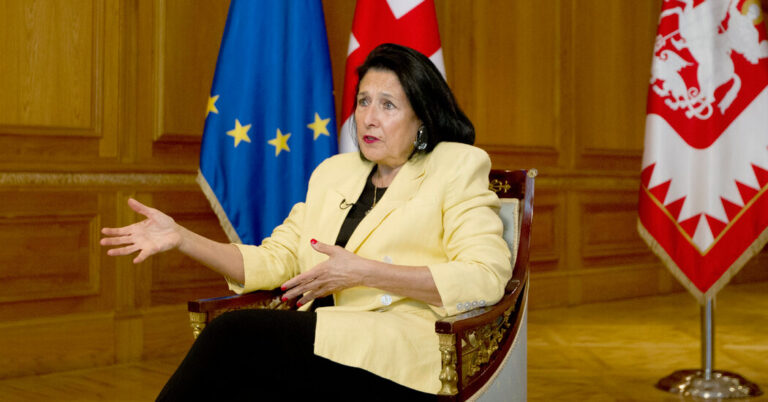Georgian President Salome Zurabichvili on Saturday rejected a proposed law on foreign influence that threatens to spark protests, plunge the country into a political crisis and derail pro-European aspirations in favor of closer ties with Russia. He said he had exercised his veto.
The Georgia General Assembly passed the bill on three readings, but it is widely expected to override the veto. The ruling Georgian Dream party, which introduced the bill, has a chance of passing it into law by May 28, when parliament reconvenes.
Mrs. Zurabichvili described her veto as “symbolic,” but it still reflects the politics between the country’s pro-Western opposition, which she supports, and the Georgian Dream party, which has been in power since 2012. It signified a new step in the confrontation.
The crisis has highlighted the highly polarized nature of Georgia’s political life. U.S. and European officials have threatened to downgrade relations with the country and impose sanctions on its leaders if the law is finalized and protests against it are quelled, enshrined in the country’s constitution. This casts doubt on the country’s pro-Western policy. .
Georgia, a mountainous country of 3.6 million people in the central Caucasus, was once a pro-Western pioneer among the former Soviet Union states. If Russia turns its back on the West and chooses closer ties with Russia, the country’s central geographic location could change the geopolitics of the entire region.
The bill that sparked the crisis has the innocuous-sounding name “Foreign Influence Transparency.”
The law requires non-governmental organizations and media organizations that receive 20% or more of foreign funding to register as “organizations serving the interests of a foreign power” and submit annual financial statements regarding their activities. It is mandatory. Georgia’s Department of Justice would be given broad powers to monitor compliance. Violations can result in fines of more than $9,000.
The ruling party argues that the bill is necessary to strengthen Georgia’s sovereignty against interference in outside political activities by Western-funded NGOs and media outlets. But the country’s vocal political opponents call it the “Russian law,” which aims to transform Georgia into a pro-Moscow state in practice, if not in name.
“This law is fundamentally Russian in its essence and spirit and contradicts our constitution and all European standards,” Mrs Zurabichvili said in announcing her veto on Saturday. “This law is not subject to any changes or improvements and can be easily vetoed,” she said in televised remarks. “This law must be repealed.”
In 2018, Mrs. Zurabishvili successfully became president with the support of the Georgian Dream party. Since then, however, Zurabichvili has increased her criticism of her party’s policies, and the process of mutual alienation culminated in her party’s failed attempt to impeach her in 2023.
Mrs. Zurabichvili was born in Paris to a prominent Georgian immigrant family who fled the Bolshevik occupation in 1921, becoming Georgia’s first public official. Zurabichvili served as ambassador to France in 2003. The following year, she received Georgian citizenship and she became the country’s first female foreign minister, a position she held until October 2005. Before becoming Georgia’s president, Zurabichvili also founded and won her own political party. In 2016 she submitted to Congress.
Although Mrs. Zurabichvili’s role is largely ceremonial, she has become the public face of protests against the Georgian Dream Party’s dominance as Georgia’s opposition struggles with internal divisions.
The capital, Tbilisi, since the bill was introduced in early April. He has been involved in protests against it. Protesters, many of whom are students, march through the streets of Tbilisi almost every day chanting “No to Russian laws.” They repeatedly laid siege to the imposing Soviet-era parliament building on Rustaveli Street and tried to block the entrance.
Many protests turned violent, with riot police forcing demonstrators from the Capitol and frequently using tear gas, pepper spray and fists to disperse them. Many members of the opposition were arrested and beaten. Some people reported being harassed and threatened by authorities. On Saturday, protesters again filled the square in front of parliament in response to Zurabichvili’s veto.
In late April, the ruling party, led by Bidzina Ivanishvili, a reclusive oligarch who returned to Georgia in the early 2000s after making a fortune in Russia, organized a rally in support of the bill. On Friday, thousands of conservative Georgians also marched in a church procession through the city center toward one of Tbilisi’s main cathedrals. Many of them said they supported the bill.
“I have friends in Ukraine, Russia and Moldova,” said Gotya Kekenadze, a farmer who joined the procession from the Kakheti region east of Tbilisi. “We want to live as before” in the Soviet Union, 62-year-old Kekenadze said. “It’s the Americans who say pick a rifle and fight Russia.”

